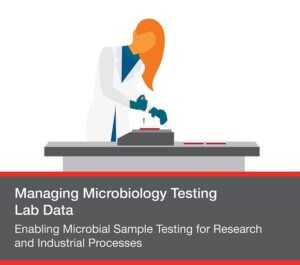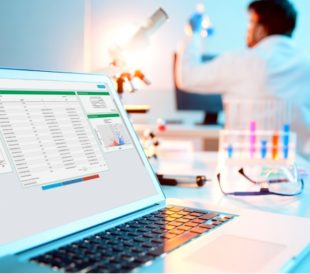Enabling Microbial Sample Testing for Research and Industrial Processes
 Microbiology laboratories play a critical role in research, and industrial processes and organizations. Microbial testing has a wide variety of uses and thus, is an incredibly complex field of study. Samples may be cultured and tested for a variety of reasons from ensuring public safety by measuring the number of microbes in food or the environment, to aiding in the diagnosis of a disease and determining a course of treatment. Though arguably more attention is paid to the development of new antibiotics or biocides, the microbiology lab is where their success and effectiveness is determined. When there is a need to detect, isolate, identify or eradicate micro-organisms, the microbiology lab should be involved.
Microbiology laboratories play a critical role in research, and industrial processes and organizations. Microbial testing has a wide variety of uses and thus, is an incredibly complex field of study. Samples may be cultured and tested for a variety of reasons from ensuring public safety by measuring the number of microbes in food or the environment, to aiding in the diagnosis of a disease and determining a course of treatment. Though arguably more attention is paid to the development of new antibiotics or biocides, the microbiology lab is where their success and effectiveness is determined. When there is a need to detect, isolate, identify or eradicate micro-organisms, the microbiology lab should be involved.
Documentation and Workflow in a Microbiology Lab
Completing documentation in a microbiology laboratory can be a time consuming and labor intensive process. In addition to documenting experimental results and chain of custody information, knowing the ideal storage conditions (time, atmospheric conditions, temperature, etc.), growth requirements, and media types to use with each culture, is crucial. Accurate inventory must also be maintained to ensure the laboratory is consistently supplied with autoclaved preparation materials, required growth media, and necessary testing equipment and reagents.
As a former technician in a commercial microbial lab and a microbiology teaching assistant, I have experienced these challenges firsthand. Whether recording the results of a Gram stain, processing HPLC (High Performance Liquid Chromatography) data regarding the purity of a biocide, or managing the laboratory supply inventory, documentation was a very time consuming part of my day-to-day role. Many of these processes could have been streamlined with the use of a Laboratory Information Management System (LIMS), which would have simplified the data management and created more time to focus on testing samples and processing results.
Data Management in a Microbial Lab
Effective data management is critical to the success of any microbial laboratory. A LIMS is a powerful tool which can be used to effectively and reliably manage microbial sample and testing data. Using a LIMS provides the laboratory with a robust process to store, access, and analyze data in a centralized location, thereby improving workflow efficiencies and minimizing risk associated with data management.
Thermo Fisher™ Platform for Science™ software can provide the data management infrastructure required to manage complex microbial laboratory workflows. Major examples of functionality in the system applied to a microbial lab could include:
- Detailed sample and culture registration including key attributes such as microbial species, sample origin, ideal storage condition and chain of custody information
- Sample testing requirements including sample type, patient symptoms and requested tests
- A comprehensive organism list providing morphology and culture growth requirements
- End-to-end sample tracking from registration, including individually configured experimental testing and other laboratory processes
- Experimental report generation for individual or groups of samples
- Site specific inventory management to monitor stock levels of critical reagents and supplies including plates, slides, media, etc.
- Record and view information regarding patients, collaborators, or shipments
In addition to solutions based on scientific domain, the Marketplace offers applications, such as the Microbial Sample Accessioning app, to provide easy to use data management workflows.
The data management requirements of any individual microbial laboratory are varied and complex. Platform for Science software was designed to provide a comprehensive and individually configurable solution to manage these types of requirements and improve the efficiency and effectiveness of the laboratory.
Michael Sessa is a Validation Supervisor at Thermo Fisher Scientific. He spent four years at Alexion Pharmaceuticals working in the Analytical Sciences department and worked for two years as a Quality Control analyst at 454 Life Sciences. He is currently pursuing his Master’s degree in Cell and Molecular Biology from Quinnipiac University.



Leave a Reply